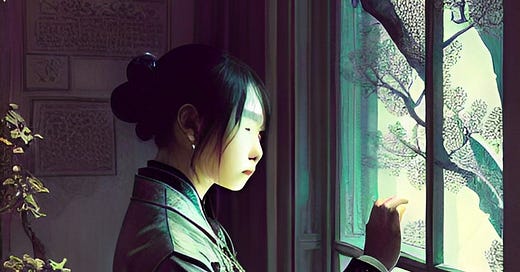By the well’s gilded railing
crickets, grasshoppers, peepers, their dark blanket
a warp and weft of night sounds.
My sleeping mat is transformed,
adorned with delicate frost, glistening dew,
altered, chilled in pale moonlight.
A lone lamp barely gives light;
my heart’s longing fills me, almost defeats me;
I am nearly overcome.
I roll up my window shade;
the silvery light of the moon floods my eyes,
a useless sigh flees my lips.
Enchanting one, distant one,
kept away, at the fringes of somber clouds,
like a faraway blossom.
Above, darkest blue, near black,
profound night lifts timeless heaven overhead;
here eternity stretches.
Below, verdant green water
roils and swirls, an endless river in motion;
forever caught in time’s flow.
Can my soul reach vast heaven,
or cross time’s churning river so deep and wide,
when only grief lies between?
In my dreams I am held back,
unable to cross the mountain, find the gate
that will lead me back to you.
Yearning without end grips me;
my very soul throbs, my longing is so great
I fear my heart will shatter.
I encourage you to read more of my Chinese poetry adaptations by clicking on the list below. Most are from the Tang Dynasty, though there are a few from other eras as well. This rendition was inspired by Li Bai (701–762), also known as Li Bo, who was a Chinese poet acclaimed from his own time to the present as a brilliant and romantic figure who took traditional poetic forms to new heights. He and his friend Du Fu (712–770) were two of the most prominent figures in the flourishing of Chinese poetry in the Tang dynasty, which is often called the “Golden Age of Chinese Poetry.” Around 1,000 poems attributed to Li are extant. His poems have been collected into the most important Tang dynasty poetry, compiled in 753 by Yin Fan. Thirty-four of Li Bai’s poems are also included in the anthology Three Hundred Tang Poems, which was first published in the 18th century. (Thanks to Wikipedia for this biographical sketch.)





